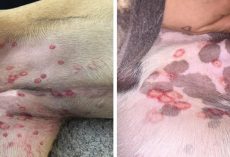Your dog is scratching nonstop, and it’s starting to worry you. While there are many reasons a pup might suddenly get extra itchy, one common cause you should know about is atopic dermatitis — and only your vet can give an official diagnosis.
Here’s a simple guide to what atopic dermatitis is, how it works and what you can do to help your dog feel better.
What Is Atopic Dermatitis?
Atopic dermatitis is a very common allergic skin condition in both dogs and cats.
The medical definition sounds intimidating — a genetically driven inflammatory skin disease involving IgE antibodies that react to environmental allergens — but the idea is simple:
Dogs with atopic dermatitis have a weakened skin barrier.
That weakness allows allergens (like pollen, dust mites or mold) to sneak through the skin more easily. Once inside, the immune system overreacts and launches an inflammatory response that makes your dog feel itchy, irritated and uncomfortable.
Over time, these repeated exposures teach your dog’s immune cells to react even more intensely to harmless things in the environment. It’s similar to eczema in humans, and research shows it also has a strong genetic component.
Common Symptoms of Atopic Dermatitis in Dogs
A dog with environmental allergies may show:
- Persistent itching
- Inflamed or irritated skin
- Red or patchy areas
- Recurrent skin or ear infections
Hotspots often appear in specific areas:
- Armpits
- Belly
- Paws
- Ears
- Face
Most dogs begin showing symptoms between 6 months and 3 years of age.
Because these signs can also mimic food allergies or flea allergies, your vet will often diagnose atopic dermatitis through a process of elimination — giving flea/tick prevention and running a food trial before confirming environmental allergies.
Treating Atopic Dermatitis in Dogs
The good news? There are many effective ways to manage your dog’s allergies and help her feel like herself again.
1. Immunotherapy (Allergy Shots)
Allergen-specific immunotherapy (ASIT) gradually exposes your dog to tiny amounts of the things she’s allergic to. Over time, her immune system becomes less reactive.
- It’s the only treatment that can truly change the immune response
- About 70–80% effective, though results vary
- Helps reduce flare-ups and long-term medication needs
2. Steroids
Steroids are powerful anti-inflammatories and work quickly to calm severe flare-ups.
Because long-term use can cause side effects, vets use them carefully — usually only for short-term relief or when other treatments aren’t possible.
3. Prescription Medications
Your vet may recommend:
- Apoquel: controls itching and inflammation
- Atopica (cyclosporine): manages immune response and inflammation
- Cytopoint: a long-lasting anti-itch injection (given at the vet clinic) that lasts four to eight weeks.
These meds can play a huge role in long-term comfort.
4. Antihistamines & Supplements
Some over-the-counter antihistamines help mild symptoms — but they work best when paired with an omega-3 fatty acid supplement to support skin health.
Try this pet-friendly antihistamine from Amazon
Try the Zesty Paws Alaskan salmon oil (omega-3 fatty acid) supplement for dogs on Amazon
There is also evidence that probiotics may also help reduce inflammation and strengthen the skin barrier over time.
Try Zesty Paws Probiotic Bites from Amazon
5. Shampoos, Creams & Lotions
Topical treatments can soothe irritated skin between flare-ups. Look for products containing:
- Chlorhexidine (antimicrobial)
- Ceramides (restore the skin barrier)
Try this anti-itch dog shampoo from Amazon
These don’t require a prescription and can make a big difference.
When to See Your Vet
Atopic dermatitis can’t be cured, but it can be managed — and the sooner your dog gets help, the more comfortable she’ll be.
If you notice signs of allergies, schedule a vet visit so you can start a personalized treatment plan. With the right care, your dog can get back to feeling healthy, happy and itch-free.
We independently pick all the products we recommend because we love them and think you will too. If you buy a product from a link on our site, we may earn a commission.





